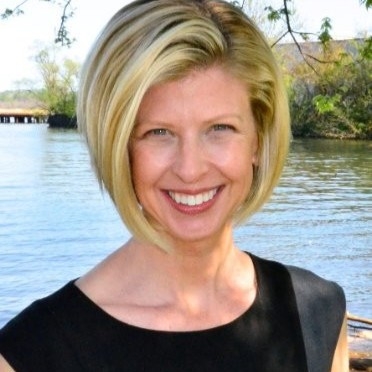Mapping ocean plastic: OMNR student Anne Usher partners with nonprofit to stem flow
July 20, 2021

By Lindsay Key
More than 11 million tons of plastic enter the ocean each year; but where does it come from? A nonprofit called OpenOceans Global is identifying shorelines around the world where large amounts of plastic have washed up, and is using an interactive current mapping system to trace the plastic back to its possible sources. Through a private section of its website, it aims to connect plastic experts and leaders of communities in those locations to help stop the flows into the ocean.
Virginia Tech Online Master of Natural Resources (OMNR) student Anne Usher served as an advisor to OpenOceans Global last fall, helping the organization to pivot its attention primarily to ocean plastic. When the nonprofit first launched in 2007, it had a broader focus, said Anne, but research in recent years has confirmed the need to focus on the pressing problem of plastic.
About 80 percent of ocean plastic comes from land-based sources, mostly rivers. Ocean plastic is harmful to seabirds and marine life when ingested, and also harmful to people—floating plastic in the oceans has been found to accumulate pollutants and transport them through ocean currents. Scientists are still studying the effects of microplastics that we may be ingesting when we eat seafood.
Developing key messaging about a complex topic
With more than 15 years as a journalist and seven years of experience in environmental communications and policy, Anne was well-positioned to help OpenOceans Global’s founders refine key messaging and acquire funding for plastics mapping and research.
From 2016 to 2020, she served as an editorial officer for The Pew Charitable Trusts, where she was the content editor for eight environmentally-focused projects, including one focused on preventing ocean plastic. Anne was responsible for editing fact sheets, chart books, photo essays, and interactive web and multimedia content. For this project, she led edits on a groundbreaking report that identified actions the world can take to cut about 80% of plastic from entering the ocean each year for the next 20 years.
On a trip to San Diego a couple of years ago, she became acquainted with Carl Nettleton, the founder of OpenOceans Global. When she made the move to the West Coast this summer, Carl quickly brought her in to work with him as he prepared to steer the nonprofit towards plastics research.
“Anne showed great interest in our work at OpenOceans Global when we first met, and I was impressed by her knowledge of the subject matter and the unique background as a former reporter that she brought to us,” said Nettleton. “Knowledge about the ocean plastic crisis is still somewhat scanty, so it is all too easy to grasp a talking point and move forward in hopes of gaining attention and support. In today’s world we believe accuracy is important. Anne’s investigative skills and her precise sense of using the right words in the right way in our written pieces has been invaluable. She dug into the subject matter and worked hard to make sure we were being accurate, and she took the initiative to achieve that end.”
Carving out a specialty
While working at Pew, Anne also began working on the MNR degree, which she said has given her the knowledge and confidence needed to branch into consulting and other work. “I still have another five classes to go, but the program has given me a much stronger understanding of the science of climate change and coastal and marine environments, and valuable insights into management and policy considerations—not only here in the U.S., but across the globe,” said Anne. “Some classes have also given me a more comprehensive, holistic way of approaching critical issues. I'm now in a much better position to help solve them.”
The OMNR program’s robust and flexible curriculum has allowed Anne to get a broad education in sustainability while also building expertise in this specialty and passion. Several faculty members have researched ocean plastic extensively in their work, including Online MNR faculty member Michelle Hilleary, who was part of an international group of scientists whose study of the environmental and economic effects of growing plastic waste was published by the journal Science in September of 2020. A version of Pew and SYSTEMIQ’s joint plastics report was also published in Science that same month.
“My coursework has been invaluable as I try to carve out a specialty in climate policy with a focus on coastal resilience,” Anne said. “For OpenOceans Global, I was able to apply a deeper understanding of the interplay between plastic waste and the ocean, including the shorelines and estuaries where much of this waste has accumulated.”

The Online MNR student Anne Usher is an editor and policy analyst with expertise in governance, foreign policy, and major global issues, including the environment and climate change. She served as an advisor for the marine nonprofit organization OpenOceans Global, which recently relaunched with a focus on ocean plastic.


